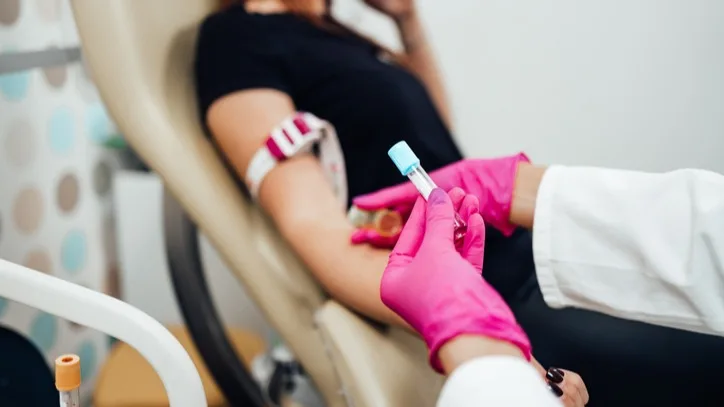
Overview
A new wave of studies and startups are pushing blood-based cancer tests into clinics, yet access and cost challenges remain.
New studies show liquid biopsy tools can guide treatment and help some patients avoid unnecessary therapy,.
At this year’s big meeting of cancer doctors, the largest in the world, a landmark study described how tracking cancer DNA in the bloodstream can help doctors outsmart breast cancer before it returns, potentially rewriting the standard of care for patients worldwide.
The study, AstraZeneca’s SERENA-6 trial, presented at the 2025 American Society of Clinical Oncology (ASCO) meeting, found that doctors can use a simple blood test to look for tiny pieces of tumor DNA, called circulating tumor DNA (ctDNA), in women with advanced breast cancer. If the test finds changes in the cancer before it shows up on a scan, doctors can switch patients to a new medicine sooner—without waiting for the cancer to get worse. In this study, women who switched medicines early stayed healthier longer than those who waited, and they also kept a better quality of life.
“This proactive approach exemplifies a new treatment strategy in oncology,” the study’s co-principal investors said in a statement. “By treating developing resistance before it causes disease progression and deterioration in quality of life, we can extend the benefit of 1st-line treatment to optimise patient outcomes.”
This trend isn’t limited to breast cancer. In colon cancer, a study showed that a personalized blood test for ctDNA can help many patients safely avoid unnecessary chemotherapy.
Results like these are occurring across oncology, as a growing wave of studies and new commercial tools are showing that blood-based DNA tests, often called liquid biopsies, can catch cancer’s return months before traditional scans, guide more personalized treatments and help avoid unnecessary therapy.
Market Momentum for ctDNA Technologies
As evidence mounts that these tests provide valuable guidance for patients and clinicians, investors and entrepreneurs are racing to develop new ctDNA technologies. Analysts estimate the market for such tests will more than triple, growing from $20 billion in 2025 to $69 billion by 2032, according to Data Bridge Market Research.
The companies developing these tests range from startups to established players. Market leaders include major diagnostics companies such as Guardant Health, Natera, Roche, QIAGEN, Illumina, Thermo Fisher Scientific and Myriad Genetics, whose liquid biopsy platforms are widely used in cancer care and research.
For instance, the AstraZeneca SERENA-6 trial used Guardant Health’s Guardant360 CDx test. Natera’s Signatera was used in more than 25 studies presented at ASCO, across 10 different cancer types and nearly 25,000 patients. Newer entrants like Lucence, Freenome, Tempus, SmartCatch, Predicine and GENECAST are also bringing innovative technologies to the field.
Barriers to Liquid Biopsy Access: Insurance and Reimbursement
Despite growing clinical evidence and excitement from researchers, coverage for ctDNA tests varies widely. Medicare currently covers some liquid biopsy tests for people with advanced cancers, particularly when the tests are FDA-approved as companion diagnostics.
However, coverage is much more limited for people with earlier-stage cancers, for recurrence monitoring or for broad cancer screening. Private insurers are inconsistent—some follow Medicare’s lead, but many still consider ctDNA tests “investigational” outside of select late-stage or approved indications. Medicaid coverage varies by state and is often even more restrictive. Most liquid biopsy tests for early detection or pan-cancer screening are not yet routinely reimbursed.
Not all research suggests these tests are cost effective. A recent review of 18 studies found that most ctDNA tests for cancer screening are not cost-effective compared to standard methods like colonoscopy, mammography or fecal testing.
In colorectal cancer, ctDNA tests can cost anywhere from about $190 to $900, compared to $30 to $50 for a fecal immunochemical test. A colonoscopy, considered the gold standard, is more expensive (often $1,000 to $2,000), but is performed much less frequently and is covered as a one-time or periodic screening.
‘A Step Forward’ in Monitoring Response to Cancer Treatment
Despite the challenges with of insurance coverage and cost-effectiveness, the surge in research and interest around ctDNA testing continues. Patients, clinicians and advocacy groups are watching this space closely, hopeful that liquid biopsy tools will soon offer safer, more personalized cancer care.
Jane Meisel, MD, a medical oncology professor at Emory University School of Medicine and a practicing physician the Glenn Family Breast Center at Winship Cancer Institute, posted a video reaction to the SERENA-6 trial news, saying it would advance the field.
“This definitely represents a step forward in our thinking about circulating tumor DNA, molecular response to treatment and how we’re going to go about approaching this in the future,” she said.








